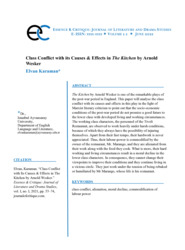Class Conflict with its Causes & Effects in The Kitchen by Arnold Wesker
-
Yazar
Elvan Karaman
-
Tür
Makale
- Yayın Yılı 2021
-
Yayıncı
Essence & Critique: Journal of Literature and Drama Studies
- Tek Biçim Adres https://hdl.handle.net/20.500.14081/1489
-
Konu Başlıkları
class conflict
alienation
moral decline
commodification of labour power
The Kitchen by Arnold Wesker is one of the remarkable plays of the post-war period in England. This paper will analyse the class conflict with its causes and effects in this play in the light of Marxist literary criticism to point out that the socio-economic conditions of the post-war period do not promise a good future to the lower class with developed living and working circumstances. The working class characters, the personnel of the Tivoli Restaurant, are observed to work heavily under harsh conditions, because of which they always have the possibility of injuring themselves. Apart from their fast tempo, their hardwork is never appreciated. Thus, their labour-power is commodified by the owner of the restaurant, Mr. Marango, and they are alienated from their work along with the food they cook. What is more, their hard working and living circumstances result in a moral decline in the lower class characters. In consequence, they cannot change their viewpoints to improve their conditions and they continue living in a vicious circle. They just work under the tension of being rebuked or humiliated by Mr Marango, whose life is his restaurant.
-
Koleksiyonlar
Fakülteler
İktisadi İdari ve Sosyal Bilimler Fakültesi

 Tam Metin
Tam Metin

